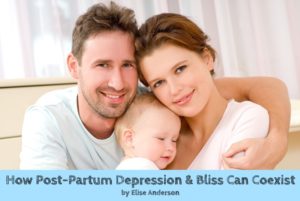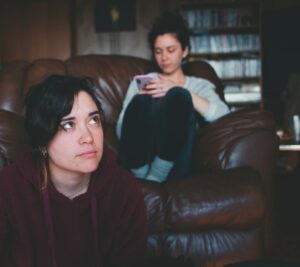I had a beautiful baby girl, a husband who was ecstatic to be a dad, and all of my physical needs met. I should have been so happy.
But I just wanted to run.
I couldn’t be comfortable in the same room with my baby. Nursing was extremely difficult. She cried incessantly. I struggled to bond with my baby. I thought it was just the “baby blues” that most women experience within the first two weeks after delivery. But as time went on, I continued to feel despair and inadequacy.
What is PPD?
As I quickly learned, Post-partum Depression (PPD) is no joke. New motherhood is itself an emotional roller coaster, but one out of seven new mothers also experience PPD. PPD is the most common complication of childbirth and is significantly underdiagnosed. And PPD can affect any postpartum mom, regardless of race or socioeconomic status.
You may feel like the early, blissful moments you anticipated with your sweet new baby have been stolen away. That was my experience, and this is my story.
Self-Prescribed Treatment
I thought maybe I could fix it myself, but the heavy cloud of hopelessness lingered well after the “baby blues” period. I tried exercising daily to lighten my moods. I took violin lessons thinking it might bring me happiness. I tried positive thinking and expressing gratitude, but none of these tactics were very effective. I thought maybe it was something marriage and family counselling could resolve. That was unsuccessful too. I couldn’t think of anything else. I was stuck.
A Relieving Solution
Approximately three months postpartum, I realized that this “haze” might be PPD. I remembered what I learned in my birthing class about PPD – that there were resources at my obstetrician’s office to get help. I set an appointment and met with the clinic’s PPD specialist for a screening. She was so understanding and nonjudgmental as I voiced my struggle. She reassured me, prescribed me medication, and kick-started my healing.
After a few weeks of treatment, I was able to build a stronger bond with my baby. I felt more energized and motivated to take care of myself, my baby, and everything else. I was finally able to feel the joy of motherhood! I loved her all along, yes, but I now had a weight lifted off of my shoulders.
Self-Love: An Added Bonus
In the months that followed, I focused on loving myself, particularly my changed body. It’s all too easy to get caught up in society’s expectations and influences to “get your body back,” and I found myself buying into it.
I had to change my perspective, or else I would never love and accept my newly abundant stretch marks and six-inch C-section scar. It was a challenge, but ultimately, I realized that I sacrificed my body to create a human life. My imperfections are proof of it, a beautiful reminder of that miracle.
My husband often reassures me how much he loves this new version of me, which definitely helps. However, I still have to actively put forth the effort to love myself, regardless of what other people think. I need my own love more than anyone else’s (sorry to break it to you, hubby 😉). I’ve come to understand that, yes, it is essential to be comfortable in my own skin, but my worth does not derive from my appearance or the amount of space I fill.
My journey of self-love has only just begun, but it has been an important component of getting to where I am today – 13 months postpartum. I now feel capable of becoming the best version of myself because I got the treatment I needed and have been cultivating self-love.
Normalizing Postpartum Depression
Having PPD is nothing to be ashamed of. It’s simply a chemical imbalance that is treatable, thanks to modern medicine. And as I mentioned earlier, it’s something that many moms experience. So know that you are not alone! This is not your fault, nor are you to blame.
If you are struggling in the same way that I was, there is no shame in taking care of yourself. Get help! If your symptoms linger past two weeks postpartum or returns anytime within one year after delivery, consider seeking medical attention.
Treating PPD may look a little different for each person. My choice of treatment doesn’t have to be yours. So explore your options!
Why PPD Matters to Everyone
If PPD has never been your issue but you have a loved one in the postpartum period, genuinely ask them how they are doing. Be a safe person for them to talk to. Help them seek treatment if necessary.
If nothing else, I hope sharing my story will foster increased compassion and understanding for the many women who experience PPD.
You deserve happiness as much as anyone else. I’m no expert, but I truly believe that PPD and bliss can coexist, because I’m experiencing it.
Let’s normalize PPD, seek and embrace healing, and end the stigma.
Resources
The following helpline and number to text are available from Postpartum Support International to help you (or a loved one) get started in the healing journey:
Helpline: 1.800.944.4773
Textline: 503.894.9453






